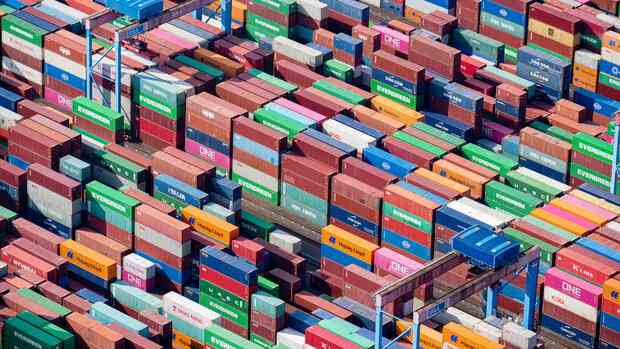Berlin The German economy calls for more support for investments in alternative markets in order to reduce dependence on China. “We see that fewer investment guarantees are being granted for German companies’ business in China,” says Ulrich Ackermann, head of foreign trade at the Association of German Machine and Plant Manufacturers (VDMA).
But investments in other countries would not be made easier in return, criticizes Ackermann. “Companies are still waiting for improved, simpler granting of investment guarantees for countries outside of China,” confirms Thomas König, Head of China at the German Chamber of Industry and Commerce (DIHK). So far, there have been hardly any concrete improvements.
In view of the increasing tensions and the sometimes very high dependence of the German economy on China, the federal government wants to encourage companies to diversify more. The companies should not “put all their eggs in one basket”, emphasizes Chancellor Olaf Scholz (SPD) again and again.
In order to reduce the concentration on China and thus also the risks for taxpayers, the federal government decided in mid-November to adjust the allocation of federal investment guarantees. Since then, there have been upper limits for the allocation to companies per country in order to reduce “cluster risks”.
According to a response from the federal government at the end of November, 14 applications with a total capital cover of around four billion euros could not be approved after this new practice.
Businesses are demanding faster procedures and more guarantees
In fact, representatives of the German economy see improvements in the support of their business in recent years – for example in Africa. However, there is still plenty of room for improvement, says Christoph Kannengiesser, Managing Director of the Africa Association, which represents the interests of German business in Africa. According to Kannengiesser, the companies wanted “even leaner processes and faster decisions”.
In addition, currency risks or the risk of default on long-term contracts in the energy sector could be hedged. This would support investments in renewable energies.
The Federal Ministry of Economics waves it away. First of all, the reduction in investment guarantees in countries with a high share of sales is enough incentive to open up other markets.
>> Also read here: Experts call for stronger transatlantic cooperation on China policy
At the same time, the traffic light has become active elsewhere, according to government circles. Recently, for example, the economics and finance ministries agreed on a new guarantee instrument for export promotion for small and medium-sized companies.
Fewer applications for funding
If there is a run on the investment guarantees, it is said that adjustments can certainly be made there as well. The options for expansion then depend primarily on the financial possibilities and thus on Finance Minister Christian Lindner (FDP). At the moment, however, the guarantee framework has not been exhausted anyway, so that there is no acute pressure to act.
On request, the Federal Ministry of Economics informed that a total of 60 billion euros were deposited in the current federal budget for investment guarantees and other measures to promote foreign trade. “This framework is about half used, so there is still enough leeway,” said a spokesman.
>> Also read here: Race for Africa – China’s influence is growing, Germany is struggling
According to its own statements, the Ministry of Economic Affairs issued new guarantees for investments amounting to 2.3 billion for the full year 2022. Almost every second approved application was made by a small and medium-sized company.
Businesses in African countries in particular often need guarantees in order to obtain funding.
(Photo: AP)
With the guarantees, companies that invest abroad are reimbursed a proportion of their losses in the event of political problems by the state – there is also a promise to use diplomatic channels to support the companies. In addition, the federal government granted export credit guarantees (so-called Hermes credits) of 14.9 billion euros (2021: 20.2 billion euros).
Details on both funding instruments are only available for the first half of the year. Accordingly, between January and June the federal government assumed new investment guarantees amounting to one billion euros. That was 0.8 billion euros less than in the same period of the previous year. Asia accounted for 71 percent of the newly assumed guarantee volume, with the majority relating to China.
Although the number of new applications rose from twelve to 32 in the first half of 2022, the volume of EUR 1.1 billion was well below the previous year’s figure of EUR 3.7 billion.
Federal aid is particularly needed for business in Africa
For companies that are active in Africa in particular, securing their investments plays a major role – especially when it comes to finding financiers.
This is reported by Amatheon Agri, an agricultural company based in Berlin that operates exclusively in sub-Saharan Africa and grows chili, peppers and other foods there for export and local trade. 1200 permanent employees work for Amatheon Agri in Germany, Uganda, Zambia and Zimbabwe.
“Investment guarantees are particularly important for the financing of large projects,” says Max Sturm, board member at Amatheon Agri. Many companies would have to bring external financiers on board for larger projects – which is not so easy when the business takes place in Africa. “Anyone who goes to a major bank and says they would like to do business in Africa will find it difficult to get the necessary financing,” says Sturm. State guarantees are a very helpful support and would have to be expanded significantly if more companies are to become active in Africa.
However, the German economy would also like more support for other regions. The companies need help from neutral location advice, says VDMA expert Ackermann. In addition, the association calls for the co-financing of market and feasibility studies and concrete financing in the form of loans and participations.
More: How dependent is the German economy on China?
